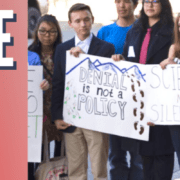Fair Maps and Power Grabs
New legislative district boundaries are drawn every ten years based on the most recent census data. In 2021 the Alaska Redistricting Board adopted a final redistricting plan for Alaska, which delineates the districts legislators will represent. The politics of redistricting are rife with power grabs, and the maps are almost always litigated.
The balance of power in the Legislature is closely divided between Republicans and the Tri-Partisan coalition of Democrats, Republicans, and Independents. The Redistricting Board is composed of a majority of Republicans, and the outcome was a map that was challenged in court on numerous fronts. The central point was that the state Senate district pairing part of east Anchorage and Eagle River constituted an “unconstitutional political gerrymander.” The court agreed and gave the Redistricting Board until April 15 to revise its maps.
Each Senate District contains two House districts. In the case of the Eagle River/East Anchorage gerrymander, the Redistricting Board adopted a Senate District that, instead of combining the two staunchly conservative Eagle River House districts, merged one of the conservative Eagle River districts with a more moderate Muldoon district. Notably, that district in question has a much greater BIPOC population than Eagle River. Should the courts have left the Senate district in place, the effect would have been a district that watered down the voting impact of Muldoon residents. There was intense disagreement from Melanie Bahnke and Nicole Borromeo, the only two redistricting board members not appointed by staunch Republicans–and the only two Alaska Native women on the Board. Ms. Bahnke and Borromeo stood up to the rest of the Board when this plan was adopted on a majority line vote, and their fight for fair representation ultimately prevailed.
The Alaska Redistricting Board has been required by the courts to revise their maps so that Alaskan voices are more equitably represented. The Redistricting Board will take public testimony tomorrow (Saturday, April 2) at 2:00 p.m. To participate in:
Anchorage, call 907-563-9085
Juneau: 907-586-9085
Other: 844-586-9085.
This Saturday is a critical opportunity to submit comments to the Redistricting Board. If you cannot be at Saturday’s meeting, you can also submit written comments in advance at https://www.akredistrict.org/map-comment/
The main talking points are:
The Board should act immediately to comply with the court’s requirements and minimize confusion if this process is dragged out. It is in the public interest to swiftly adopt a map with final senate pairings so that voters can familiarize themselves with their new districts, precincts, and voting locations, on top of a new election system (RCV) and an unprecedented special election. The redistricting Board has an obligation to the public to resolve this quickly to avoid voter confusion and disenfranchisement.
In Anchorage, the Board should adopt the Senate pairings proposed by Redistricting Board member Melanie Bahnke instead of coming up with new pairings. These pairings, proposed by Melanie Bahnke, have been presented and considered on the record and were informed by public input and testimony. These pairings do not change districts’ underlying deviation and uphold the one person, one vote principle. In addition, they are the common-sense geographic and socioeconomic pairings (keeping Muldoon w/ Muldoon, West Anc. w/ West Anc, Eagle River w/ Eagle River, etc.).
Plan to participate and help secure Alaska’s more just and equitable redistricting map.
Thank you!
The Alaska Center









